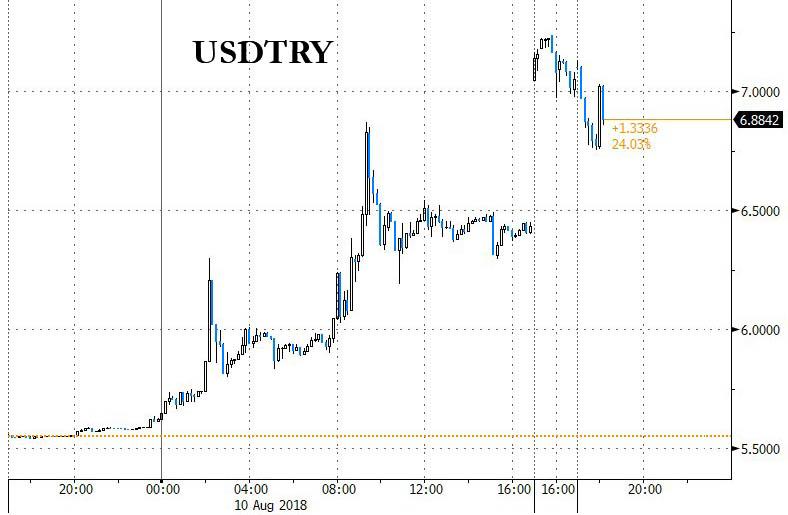In the first tentative step toward the final option available for Erdogan to halt the Lira’s accelerating collapse – which crashed as low as 7.2362 earlier after the Wellington FX open following the the Turkish president’s latest belligerent comments – namely capital controls, the Turkish Banking Regulation and Supervision Agency imposed a limit on the amount of foreign currency and lira swap and swap-like transactions, which are not to exceed 50% of the bank’s shareholder equity. Furthermore, new transactions are halted “until current over-shootings mature.” Whether this tentative move to limit the amount of TRY FX speculation will work remains to be seen: the kneejerk reaction to its announcement helped send the
Topics:
Tyler Durden considers the following as important: 5) Global Macro, Featured, newsletter
This could be interesting, too:
Eamonn Sheridan writes CHF traders note – Two Swiss National Bank speakers due Thursday, November 21
Charles Hugh Smith writes How Do We Fix the Collapse of Quality?
Marc Chandler writes Sterling and Gilts Pressed Lower by Firmer CPI
Michael Lebowitz writes Trump Tariffs Are Inflationary Claim The Experts
In the first tentative step toward the final option available for Erdogan to halt the Lira’s accelerating collapse – which crashed as low as 7.2362 earlier after the Wellington FX open following the the Turkish president’s latest belligerent comments – namely capital controls, the Turkish Banking Regulation and Supervision Agency imposed a limit on the amount of foreign currency and lira swap and swap-like transactions, which are not to exceed 50% of the bank’s shareholder equity.
| Furthermore, new transactions are halted “until current over-shootings mature.”
Whether this tentative move to limit the amount of TRY FX speculation will work remains to be seen: the kneejerk reaction to its announcement helped send the lira from below 7.00 vs the USD to as low as 6.75 in very thin trading conditions, but it has since slumped back toward the 7.00 barrier. |
USD/TRY daily |
Commenting on the swap-transaction limits, Raymond Lee, Managing Director of Kapstream Capital told Bloomberg TV that they will not be enough, noting that “the first step is taking some regulations through the banks and through swap lines is certainly one measure. I don’t think that’s going to be enough.”
Instead, like almost everyone else, Lee said that interest rates will have to increase substantially to stem the lira’s decline: “I think they’re gonna have to raise it by at least 5-10% so you’re taking the interest rate from 17.75% to 20, 25, maybe even 30%. It just depends on how much the lira continues to fall at the moment.”
Lee also said that Ankara’s “mismatched” economic priorities are also to blame:
“They’ve promoted short-term growth through too much credit growth at the expense of long term economic stability, so they’re now forced to act.”
As a reminder, some view capital controls by Turkey as a short-term band aid, and potentially the worst possible “solution”, as it could be the catalyst that spreads contagion to other emerging markets. On Friday, Robert Marchini, a political strategist at Zenith Asset Management laid out to Bloomberg how he see the “worst case scenario” for Turkey:
Regarding Turkey as a potential ‘Black Swan’-level event, I’m skeptical the collapse of the currency per se would be enough of an incident. The market has known for a while Erdogan was leading the country in an economically reckless direction. The real question was when it all would blow up (although I don’t think anyone thought it would go down this quickly.) More specifically, I think that the [EU] banks’ exposures to both external debt and local operations, while significant, are not at a crisis level.
Where the real risk lies, and one that I think has not been adequately considered, is the markets’ reaction to [potential] capital controls. Should Erdogan impose capital controls, in addition to banks’ writedowns on [now-toxic] Turkish assets, investors’ reaction is likely to be panic and to yank capital out of other EMs before either A. That EM’s currency falls further and/or B. That EM’s government gets the same idea as Turkey.
This becomes somewhat of a self-fulfilling prophecy, and in my opinion is where the real possibility for contagion lies.
Separately, in another troubling development, Bloomberg cites an Asia-based FX trader who said that as TRY vol soars “some clients are choosing to watch their own orders rather than leave it with a bank, adding to widening pressure on price spreads.” The trader also said that banks are “preferring clients declare their side on deals rather than ask for two-way prices.”
This may be a reflexive reaction to the pandemonium in the aftermath of the SNB’s decision to remove the 1.20 peg against, resulting in massive stop losses and numerous accounts getting margined out.
As to what it means for the lira, with Erdogan refusing to even consider a rate hike or an IMF intervention, even as diplomatic ties with the US frayed further when the Turkish president hinted that he would seek “alternative alliances” and had a “weapon” against Trump, whom he accused of instigating the currency collapse, it is difficult to see how besides the occasional kneejerk short squeeze to a headline here or there, the ongoing FX collapse is halted.
Tags: Featured,newsletter

